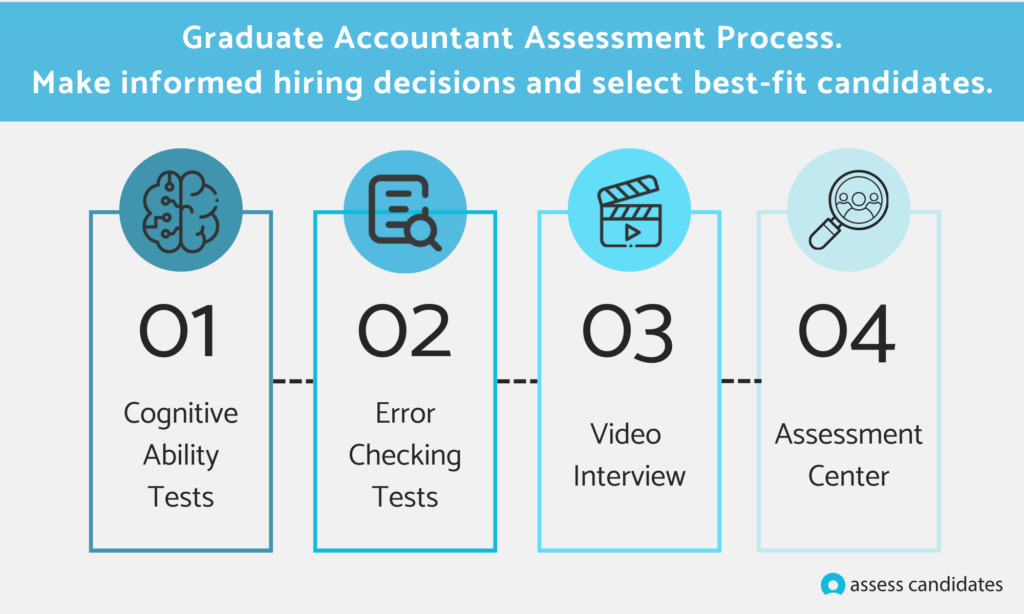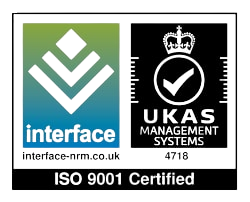Hiring for Graduate Accountants: Why this pre-employment recruitment process should be adopted
As recruiters, you will be aware that there is currently an increased emphasis on finding skilled and motivated Graduate Accountants. Almost every organization, whether a large international corporation or small start-up, needs accounting services. However, the turnover rate within accountancy is high, and the number of students now graduating with Accounting degrees is dropping. Therefore, it is important that in your hiring processes you look beyond educational qualifications and focus on assessing candidates’ authentic skills and strengths.
In this short piece, we outline step-by-step our recommended pre-employment assessments and recruitment process for a Graduate Accountant to ensure you hire best-fit candidates who have the necessary skills to pass any professional accounting qualifications and succeed within your company.
Contents:
- What is a Graduate Accountant and what do they do?
- What is the best assessment process to hire the right Graduate Accountant?
- Concluding remarks
1. What is a Graduate Accountant and what do they do?
What is a Graduate Accountant?
A Graduate Accountant is a trainee accounting role, often part of a structured graduate programme offered by accounting firms or other financial services organizations. Most programmes aim to expose graduates to a variety of accountancy projects and core functions to help them kick start their careers in this sector.
What is the career path for a Graduate Accountant?
After passing professional accounting qualifications, Graduate Accountants may choose to specialize in areas such as:
- Management accounting
- Financial accounting
- Tax audit
- Corporate finance
What would be the roles and responsibilities of a Graduate Accountant for my organization?
The primary duty of Graduate Accountants is to assist more qualified accountants with managing the financial information, day-to-day accounting needs, and tax issues of individual clients or organizations to help them make strategic financial decisions. This is whilst formally studying to gain technical knowledge of the accounting profession in preparation for professional exams and qualifications.
Common responsibilities for a Graduate Accountant include:
- Helping to audit the financial performance and health of businesses
- Managing invoices for company clients, paying bills, and managing accounts payable and accounts receivable
- Administrative tasks, such as analyzing costs and budgets, asset inventory, verifying and inputting data, payroll tasks, and documenting financial transactions
- Collaborating with and under the supervision of experienced senior accountants on projects
- Learning to use various accounting softwares and systems
- Preparing, presenting, and reviewing financial reports for senior management
- Helping clients with their tax obligations and tax return forms
- Maintaining up-to-date and accurate financial records that comply with relevant legislation and industry standards

What skills does a Graduate Accountant need to have a successful career in my organization?
A successful Graduate Accountant is not just someone who is good at number crunching. There are several other essential skills and attributes that are needed to succeed within accounting and that, therefore, you should assess in your Graduate Accountant recruitment process. These are:
- Problem-solving and analytical skills
- Numerical reasoning skills
- Teamwork and collaboration
- Written and verbal communication skills
- Presentation skills
- Self-confidence, motivation, and commitment
- Attention to detail and accuracy
- Time management skills
- Financial and commercial awareness
- Critical thinking skills
- Organizational and multitasking skills
- Computer and IT skills
Create a hiring assessment process for your Graduate Accountant role. Fast. HIRE FOR FREE
2. What is the best assessment process to hire the right Graduate Accountant?
When recruiting for a Graduate Accountant role, we recommend implementing an assessment process that tests candidates not just for their numerical skills but also for the wide range of other skills and competencies required for accountancy. That is why we have outlined step-by-step the most robust assessments to include in your Graduate Accountant recruitment plan to ensure you hire the right candidates first time.

1. A Pre-employment Numerical Reasoning Test
At the initial sifting stage of recruitment for a Graduate Accountant, it is best practice to ask candidates to take an online pre-employment numerical reasoning test. This will look at how candidates’ handle numbers but, more importantly, it will assess their ability to understand, interpret, and reason with numerical data in the form of tables, charts, and graphs and reach a logical conclusion.
Both in the workplace and for their professional qualifications, Graduate Accountants are expected to have an excellent level of numeracy. They will work heavily with numerical data in managing invoices, income, tax, payroll, costs, and financial reports. Therefore, using the results of the numerical reasoning test, you can quickly and effectively predict candidates’ accounting capabilities and select only those who possess the desired numerical skills to pass to the next stage of recruitment.
2. Pre-employment Verbal and Logical Reasoning Tests
At this initial sifting stage, we also advise combining the pre-employment numerical reasoning assessment with other aptitude tests for recruitment to cover the wide range of technical skills required for a Graduate Accountant role.
What other aptitude tests should I include at the initial stage of recruitment for my Graduate Accountant role?
For your Graduate Accountant role, you should consider including these skill-based pre-employment tests in the assessment process:
- A pre-employment verbal reasoning test: Graduate Accountants, in the workplace and in their professional qualifications, will be required to write long financial reports, concisely present important information, and communicate by email and in meetings with both clients and other key stakeholders, including senior management. Assessing candidates’ communication and verbal reasoning skills is thus imperative to determine whether they are right for the accounting role.
- A critical thinking test, such as a non-verbal pre-employment logical reasoning test: In the workplace, Graduate Accountants will also need to make complex fast decisions and be responsive to solving difficult problems using their critical and logical thinking. A logical reasoning test is thus a great way to assess candidates’ problem-solving skills, logical thinking skills, and analytical skills.
Including a combination of these skills-based aptitude assessments at the sifting stage of your Graduate Accountant hiring process, will quickly and accurately test candidates against the plethora of technical skills required for the role and help you shortlist only the most qualified to invite to the interview stage.
Did you know that if you combine aptitude tests together at the initial stage of the Graduate Accountant assessment process, you can reduce your candidate pool by 50%? This is particularly useful for graduate programme recruitment to speed up screening a high volume of candidate applications.
3. Pre-employment Error Checking Tests
During the early sifting stages of hiring for a Graduate Accountant, it is best practice for candidates to also take numerical and verbal pre-employment error checking tests. These tests measure candidates’ attention to detail and accuracy by requiring them to quickly check two sets of data, either numerical figures or written information, and identify if there are any errors/differences.
Graduate Accountants are expected to be attentive and have a strong eye for detail to ensure accuracy when auditing, reviewing reports and entries, and inputting large amounts of data into accounting software and systems. Even the smallest errors, such as an incorrect decimal point, can cause serious consequences in accounting work. Error checking tests can therefore help you select candidates who will be able to spot errors quickly and deal with them under pressure when working as a Graduate Accountant.
Although error checking tests are a simple task, the short time limit and negative marking separates those candidates who have the desired attention to detail from those who are less attentive and will find this task more difficult.
4. A Pre-hire Video Interview
For the penultimate stage in your Graduate Accountant recruitment process, we recommend presenting shortlisted candidates with a one-way video interview, where they will be asked to record answers to a series of predetermined questions under timed conditions. From their answers, you will be able to learn more in-depth about your candidates’ skillset, abilities, accounting experience, and suitability for the role and your company.
As a recruiter, how should I build my Graduate Accountant video interview?
For a Graduate Accountant video interview, you should typically present 5-10 questions, which could be competency-based, strength-based or situational. Questions could also cover technical topics, such as accounting knowledge and experience or simply ask about who the candidate is, what motivates them, and why they want to work in accounting and your company etc. As recruiters, you can assess candidate responses against your own hiring criteria to determine who has the overall skills and potential to succeed at your organization.
5. An Assessment Center
The final step in your Graduate Accountant assessment process, especially if you are hiring for an Accountancy graduate scheme, is to invite the top candidates to a virtual or in-person assessment center day. This is designed to help you build the most comprehensive picture of your candidates and predict their on-the-job performance.
How should I set up an assessment center day for my Graduate Accountant role?
The Graduate Accountant assessment day should involve a mix of exercises that will highlight candidates’ natural competencies, strengths, and weaknesses. We recommend:
- A group exercise to assess how well candidates interact and work with others under pressures and against challenges
- An in-tray exercise where different tasks and documents need to be organized, prioritized, and fulfilled within a time limit
- A presentation
- A one-to-one interview with a panel of senior staff – you should ask the candidates questions about them, their motivations for the role, interests, experiences, and careers aspirations
- Retesting of aptitude tests
As assessors, from these exercises, you will be able to make informed hiring decisions regarding which candidates are most suitable for the accounting role, the team, and company culture and finally select those you would like to hire.
Be aware that assessment centers are also designed to give candidates insight into your company, its culture, and the daily situations employees face, so they can determine whether you are the right employer for them.
3. Concluding remarks
By including these specific assessments in your Graduate Accountant recruitment process, you will be able to quickly and effectively assess candidates for the wide range of skills and competencies needed for your Graduate Accountant position, rather than focusing solely on their numerical aptitude. You will gain comprehensive insight into your candidates which will ensure you, as recruiters and hiring managers, can make the most informed hiring decisions and, ultimately, select the top Graduate Accountants to work for your company.
Interested in getting the latest insights and advice on candidate assessment? Sign up with your email below to get started.

